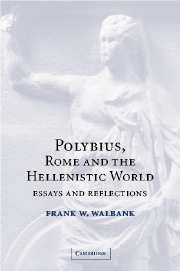Book contents
- Frontmatter
- Contents
- Preface
- Acknowledgements
- List of abbreviations
- 1 Polybian studies, c. 1975–2000
- HISTORICAL AND GEOGRAPHICAL PAPERS
- POLYBIUS AS A HISTORIAN
- POLYBIUS ON ROME
- 16 Supernatural paraphernalia in Polybius' Histories
- 17 ‘Treason’ and Roman domination: two case-studies, Polybius and Josephus
- 18 A Greek looks at Rome: Polybius vi revisited
- TRANSMISSION OF POLYBIUS
- Bibliography
- Indexes
16 - Supernatural paraphernalia in Polybius' Histories
Published online by Cambridge University Press: 22 September 2009
- Frontmatter
- Contents
- Preface
- Acknowledgements
- List of abbreviations
- 1 Polybian studies, c. 1975–2000
- HISTORICAL AND GEOGRAPHICAL PAPERS
- POLYBIUS AS A HISTORIAN
- POLYBIUS ON ROME
- 16 Supernatural paraphernalia in Polybius' Histories
- 17 ‘Treason’ and Roman domination: two case-studies, Polybius and Josephus
- 18 A Greek looks at Rome: Polybius vi revisited
- TRANSMISSION OF POLYBIUS
- Bibliography
- Indexes
Summary
Polybius is, of course, our main guide to the seventy or so years during which Rome achieved domination over the eastern Mediterranean – a domination that consisted in every people henceforth being obliged to do what the Romans told them to do. Like Thucydides before him, Polybius was active as a statesman and general and was personally involved in many of the events of the early second century. His own career had many ups and downs – first as a politician in Achaea, then as a detainee at Rome, and finally as a protégé of the influential Scipionic family, playing an active rôle in decisive wars and their aftermath. It would indeed be odd if his own career and changes of personal fortune had had no impact upon his work; and one of the objects of the present chapter will be to try to analyse the nature of that impact.
Polybius frequently emphasises the importance of truth and impartiality in writing history. But in fact his work contains || several examples of plain bias, arising out of his own particular background. The hated rival Aetolian League was of course a bête noire to the Achaean historian; and he is not very fond of Athens either, for she had consistently refused to join the Achaean Confederation. Achaea itself and especially his home town of Megalopolis usually get favoured treatment. But there are other states and individuals about whom he is less than impartial.
- Type
- Chapter
- Information
- Polybius, Rome and the Hellenistic WorldEssays and Reflections, pp. 245 - 257Publisher: Cambridge University PressPrint publication year: 2002
- 2
- Cited by

